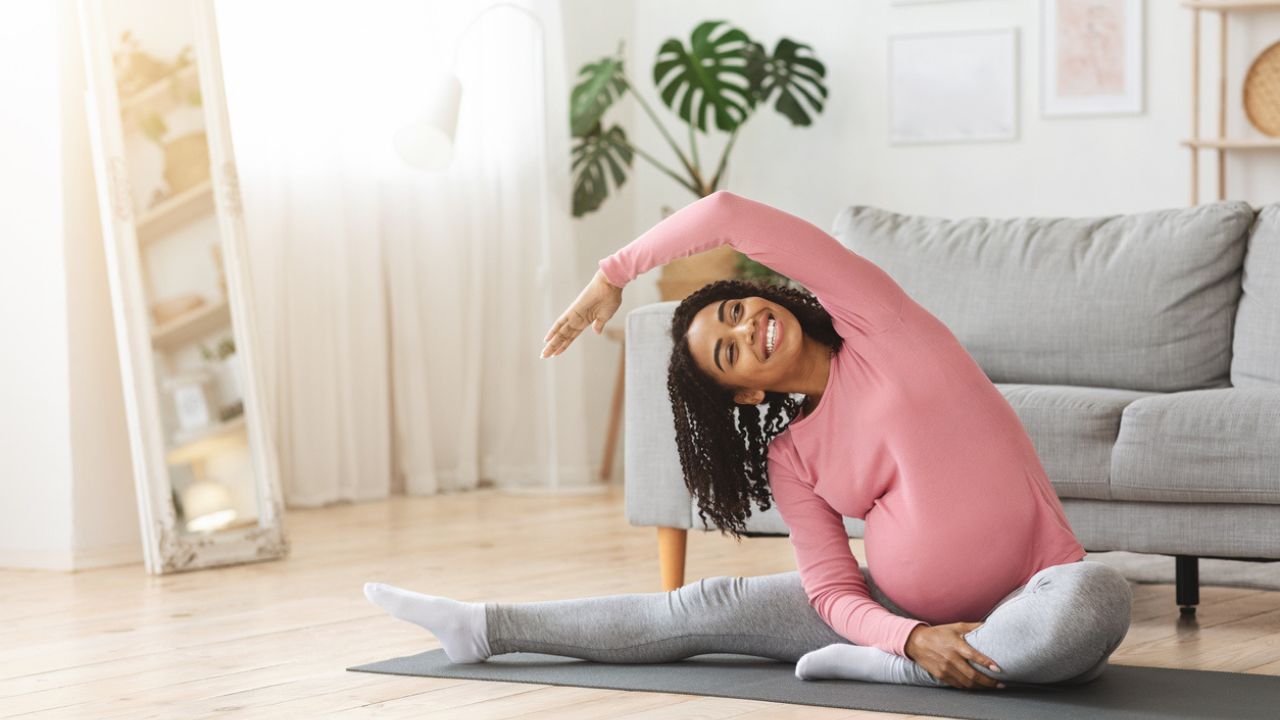Women’s fitness specialist and Healthista Collective Expert Rosie Stockley reveals what exercise you should and shouldn’t do during pregnancy
Most of the demands placed on our body as we exercise are not detrimental to our pregnancy.
In fact, the adaptations we get from being active help our pregnancy journey and certainly aid birth and recovery.
Physiologically, mentally and emotionally giving birth surpasses some of the most extreme endurance events.
In order to build this endurance, most research suggests that maintaining an active pregnancy will allow your body to be able to cope with the demands of birth.
There is no one activity that is better than the other. The important thing is you move your body more and spend less time sitting down.
There are a couple of things you need to take into consideration however, from not holding your breath to sticking to what you know, here’s what you should and shouldn’t be doing…
For the first 12 weeks – be careful!
The first trimester is generally the ‘riskiest’ time, so it’s important to be happy and confident about any exercise you’re undertaking.
listen to your body: take a break from the higher intensity cardio and weights
Many people choose to take it easy at this stage, to ensure they are happy and not feeling anxious about their exercise choices. If you currently don’t do any exercise, maybe just keep active by walking regularly and aim to start more formal fitness work in the second trimester.
If you are already active, and feel you need to reduce the intensity, then listen to your body: take a break from the higher intensity cardio and weights, and choose something a little more relaxing.
READ MORE: Exercise & Pregnancy – your questions answered
Stick to familiar movements
Throughout pregnancy it is advised to exercise in a way in which you are familiar, and adjust the intensity as needed. The body changes a lot so it’s good to have a benchmark of what might be ‘normal’ for you.
The growing abdomen changes your centre of gravity so movements will feel different
If you do want to start exercising in your pregnancy, it’s great to get into a good routine of that, but perhaps use a programme designed for pregnancy from an experienced trainer, or if you can afford a few private sessions they might give you a great start.
The growing abdomen changes your centre of gravity so movements will feel different – you may have to change your stance and observe closely your posture.
In addition, the hormone relaxin will be present in your body which results in the ligaments around the joints being more mobile (great for helping prepare the body for birth, but this can result in instability so be careful when you’re exercising, using weights and don’t overstretch.
Find a specialist pregnancy class
There are some really great antenatal yoga, Pilates and exercise classes that are especially formulated to address the changes in your body and work to prepare the muscles for childbirth.
A class will work to keep you motivated through your pregnancy, and you’ll meet like-minded women to support you.
Alternatively, there are specialist pre and postnatal fitness trainers who can take you through the adaptations you might want to consider throughout your pregnancy exercise routine.
A class will work to keep you motivated through your pregnancy
READ MORE: Pilates for pregnancy to keep you active in your third trimester
Fitness no’s in pregnancy…
It is best to consult with an antenatal fitness specialist before embarking on a pregnancy fitness regime, as our body’s needs and fitness levels are all different.
However, these are a few of the things that are contraindicated to all:
Holding your breath
It is so important that the baby receives oxygen, and this comes directly from your breathing. So no straining and holding breath and no static moves like planks where it is hard to breathe deeply.
avoid lying on your back if possible after week 12
Lying on your back
After the first trimester, the growing baby means that the risk of supine hypotensive syndrome is greater. This is where the growing uterus presses on the inferior vena cava which is responsible for carrying blood back to the heart.
It is important not to restrict blood flow when pregnant so avoid lying on your back if possible after week 12.
Body temperature
Avoid raising the temperature of the foetus as this can cause central nervous system disorders so avoid getting overheated, drink water and take breaks to cool the body down, and avoid saunas and steam rooms.
READ MORE: Can’t sleep during pregnancy? Holistic sleep coach reveals 7 easy tips
Intra-abdominal pressure
For example, avoid planking and crunches. These are a no-no, as you want to avoid moves that create tension in the abdomen.
avoid getting overheated, drink water and take breaks to cool the body down
Feel confident exercising in your pregnancy by talking through your needs with women’s fitness specialist Rosie Stockley.
Book your pregnancy consult session with Rosie here.
In your session Rosie can help you find adaptations for your workouts, figure out what might be best for you at each stage of your pregnancy, answer any questions about aches and pains, or certain movements.
Rosie can talk through her experiences of labour and signpost you to specialists or experts in other related areas. She is also a great encouragement and will pep you up, make you feel energised and confident.
You’ll leave the session with a smile and feeling like you’ve really taken a positive step for YOU.
Sessions are completely tailored to YOUR needs! Maybe you need a list of exercises, maybe you just need to check in once a month to have a confidence boost. We will make it work for you! *Please note, Rosie can’t give medical advice.
Like this article? Sign up to our newsletter to get more articles like this delivered straight to your inbox.
























































